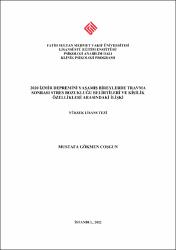2020 İzmir Depremini Yaşamış Bireylerde Travma Sonrası Stres Bozukluğu Belirtileri ve Kişilik Özellikleri Arasındaki İlişki
Künye
COŞKUN, Mustafa GÖKMEN, 2020 İzmir Depremini Yaşamış Bireylerde Travma Sonrası Stres Bozukluğu Belirtileri ve Kişilik Özellikleri Arasındaki İlişki, Fatih Sultan Mehmet Vakıf Üniversitesi Lisansüstü Eğitim Enstitüsü Psikoloji Anabilim Dalı Klinik Psikoloji Programı, Yayımlanmamış Yüksek Lisans Tezi, İstanbul 2022.Özet
Bu çalışmanın amacı 2020 İzmir depremini yaşayan bireylerde TSSB yaygınlığını, TSSB’nin yordayıcı faktörlerini ve kişilik özelliklerinin TSSB’ye etkisini incelemektir. Bu kapsamda literatürde TSSB’yi etkilediği belirtilen çeşitli demografik değişkenler ve deprem anı ve sonrası ile ilgili sorular oluşturulmuştur. Çalışmanın örneklemi İzmir depremini yaşayan 423 yetişkin kişiden oluşmaktadır. Çalışmada demografik bilgi formu, depremle ilgili soruların yer aldığı bilgi formu, DSM 5 için Travma Sonrası Stres Bozukluğu Kontrol Listesi ve Büyük Beş - 50 Kişilik Testi kullanılmıştır. Çalışmada 97 kişinin DSM 5 için TSSBKL ölçeğinden 48 puan ve üstü alarak TSSB tanısı alabilecek düzeyde oldukları tespit edilmiştir. TSSB’yi yordayan risk faktörleri arasında kadın olmak, genç yaşta olmak, depremden ekonomik anlamda olumsuz etkilenmek, deprem sonrası evin hasar alması, deprem sonrası ev değiştirmek ve tanıdığı birinin yaralanması yer almıştır. Katılımcıların TSSB puanlarını yordamak için yapılan Çoklu Doğrusal Regresyon Analizi sonucuna göre deprem anında hissedilen korku şiddeti TSSB’nin önemli bir yordayıcısı olarak bulunmuştur. Kişilik özelliklerinin TSSB ile ilişkisinin incelenmesi amacıyla yapılan Çoklu Doğrusal Regresyon Analizi sonuçlarına göre ise Duygusal Dengelilik Faktörünün TSSB’yi yordadığı tespit edilmiştir. Tanı alabilecek grupta ise Dışadönüklük, Duygusal Dengelilik ve Zeka / Hayal Gücü Faktörleri TSSB’yi yordamaktadır. Bu bulgular, psikologların doğal afetlere maruz kalan insanlar için müdahale stratejileri geliştirmeleri ve TSSB tanısı olan bireylerin iyileşmesine yardımcı olmaları için faydalı olabilir. This study aims to examine the prevalence of PTSD, the predictive factors of PTSD, and the effect of personality traits on PTSD in individuals who experienced the 2020 Izmir earthquake. In this context, various demographic variables that are stated to affect PTSD in the literature and questions about the moment and after the earthquake were created. The sample of the study consists of 423 adults who experienced the Izmir earthquake. Demographic information form, information form including questions about the earthquake, Post Traumatic Stress Disorder Checklist for DSM 5 and Big Five-50 Personality Test were used in the study. The study determined that 97 people were at a level to be diagnosed with PTSD by getting 48 points or more from the Post Traumatic Stress Disorder Checklist scale for DSM 5. Among the risk factors predicting PTSD were being a woman, being young, being negatively affected by the earthquake, damage to the house, changing house after the earthquake, and injury to a friend. According to the Multiple Linear Regression Analysis results performed to predict the PTSD scores of the participants, the severity of fear felt at the time of the earthquake was an important predictor of PTSD. According to the Multiple Linear Regression Analysis results conducted to examine the relationship between personality traits and PTSD, it was determined that the Neuroticism Factor predicted PTSD. In the group that can be diagnosed, Extraversion, Neuroticism, and Openness Factors predict PTSD. These findings may be useful for psychologists to develop response strategies for people affected by natural disasters and to help individuals with PTSD recover.



















